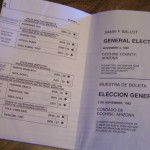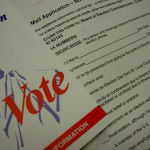Menu
Hot-Topics
February 19, 2026 | SCOTUS Reaffirms Fourth Amendment Standard for Police Responding to Household Emergencies
Category: US Constitution

FCC v. Pacifica Foundation: The Supreme Court and “Filthy Words”
It is seldom that the Justices use foul language in an opinion of the Supreme Court of the United States, except when the case at issue is about foul language. FCC v. Pacifica Foundation v. Fox Television Stations centered on fines levied against Fox...

Baker v. Carr: The Most Important Voting Rights Decision of the Twentieth Century
The Supreme Court has issued several notable voting rights decisions over the past one hundred years. However, very few had the impact of Baker v. Carr. In fact, Justice Earl Warren chose Baker v. Carr—not Brown v. Board of Education—as the “mo...

Armour v. Indianapolis: Do Unequal Taxes Violate the Constitution?
Taxes are perpetually a source of debate in this country, from federal taxes right down to the water and sewer taxes charged by local municipalities. Legal disputes often arise when certain taxpayers feel they are paying more than their fair share. I...

Citizens United Decision That Created “Super Pacs” May Be Reconsidered
The U.S. Supreme Court’s controversial decision in Citizens United v. Federal Election Commission, 558 U.S. 310 (2010) has taken quite a beating in recent weeks. The decision, which gave rise to the “Super Pacs” has been criticized for givi...

Will the Voting Rights Act Come Before the Supreme Court Again?
The debate is growing over Section 5 of the Voting Rights Act of 1965, which requires states and municipalities with a history of voter discrimination to obtain federal approval before making any changes to their voting laws. Republican attorneys ...

Brown v. Board of Education Marks 58th Anniversary, But Has Segregation Gone Away?
On Thursday, May 18 it was 58 years since the U.S. Supreme Court held in Brown v. Board of Education that segregation in public schools violated the Fourteenth Amendment of the U.S. Constitution. While that case led to a national policy of school d...

The Ministerial Exception: Does It Extend Beyond Hosanna-Tabor?
A controversial employment discrimination lawsuit pending in Indiana may test the limits of the “ministerial exception,” most recently considered in Hosanna-Tabor Evangelical Lutheran Church and School v. EEOC. Both cases involve the power of rel...

Does Padilla v. Kentucky Apply Retroactively? Supreme Court to Decide Next Term
The U.S. Supreme Court has agreed to revisit its decision in Padilla v. Kentucky to determine if its ruling should be applied retroactively. The landmark ruling tackled the controversial link between deportation and criminal offenses, ultimately con...

Will the Arizona Immigration Case Reshape the Balance of Power Dating Back to McCulloch?
In April, the U.S. Supreme Court heard oral arguments in the landmark case, State of Arizona v. United States. The lawsuit addresses the authority of the state of Arizona to enact its own immigration enforcement laws instead of following federal regu...

New Jersey v. T.L.O. – Protecting Students in a Dangerous World
Schools have long been considered safe havens, places where children should be able to learn without fear. However, school violence seems to be reaching epidemic levels. In seeking to address the problem, there is a fine line between protecting st...
Previous Articles
SCOTUS Decision in Bowe v. United States Is First of the 2026 Term
by DONALD SCARINCI on February 5, 2026
In Bowe v. United States, 607 U.S. ___ (2026), the U.S. Supreme Court held that Title 28 U.S.C. § ...
SCOTUS Rules State Can’t Immunize Parties from Federal Civil Liability
by DONALD SCARINCI on January 29, 2026
In John Doe v. Dynamic Physical Therapy, LLC, 607 U.S. ____ (2025) the U.S. Supreme Court held that...
Supreme Court to Address Racial Discrimination in Jury Selection
by DONALD SCARINCI onWhile the U.S. Supreme Court has concluded oral arguments for the year, it continues to add cases t...
The Amendments
-
Amendment1
- Establishment ClauseFree Exercise Clause
- Freedom of Speech
- Freedoms of Press
- Freedom of Assembly, and Petitition
-
Amendment2
- The Right to Bear Arms
-
Amendment4
- Unreasonable Searches and Seizures
-
Amendment5
- Due Process
- Eminent Domain
- Rights of Criminal Defendants
Preamble to the Bill of Rights
Congress of the United States begun and held at the City of New-York, on Wednesday the fourth of March, one thousand seven hundred and eighty nine.
THE Conventions of a number of the States, having at the time of their adopting the Constitution, expressed a desire, in order to prevent misconstruction or abuse of its powers, that further declaratory and restrictive clauses should be added: And as extending the ground of public confidence in the Government, will best ensure the beneficent ends of its institution.
Awards





